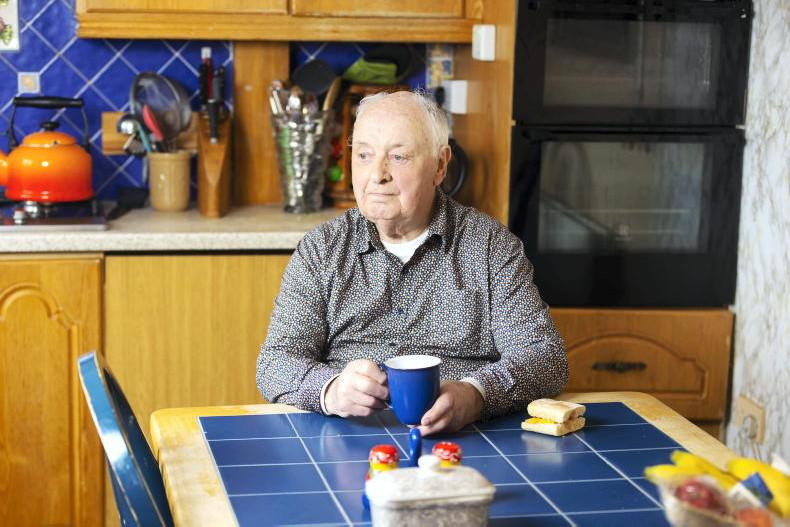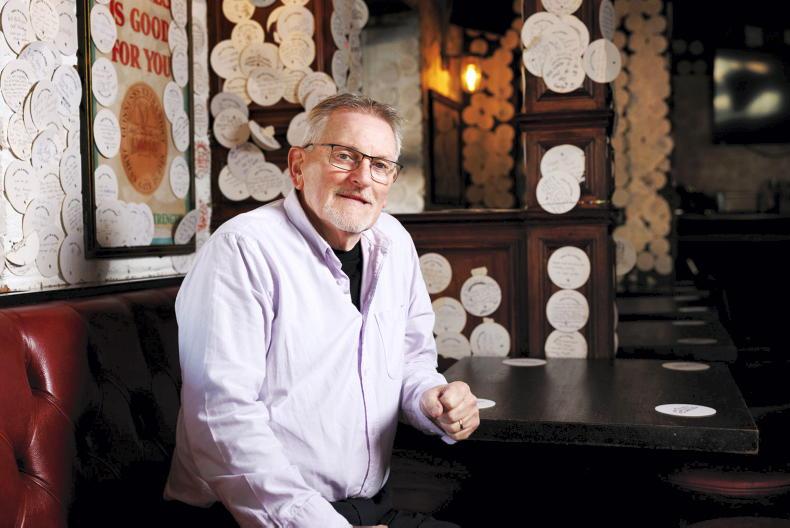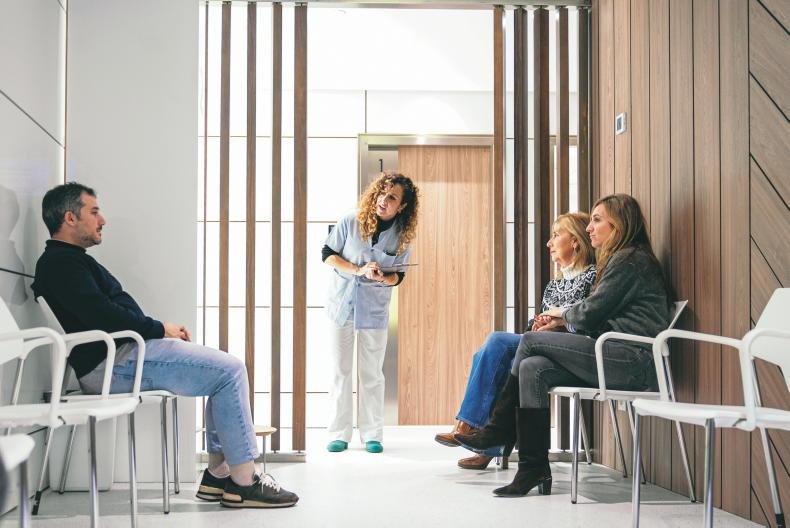Hugh O’Rourke (82) has a message for the men of Ireland: get your prostate checked regularly.
The retired dairy industry consultant from Co Carlow, has been advocating for these health checks since he was diagnosed with prostate cancer in 2023.
“I would suggest that for anybody who is more than 50 years old, make sure that you have a regular PSA check,” he says, “and that you have a feisty GP who is going to chase the consultant.”
Hugh began to have routine annual check-ups after retiring as a manager with Glanbia in Ballyragget in 1999.
“Although my general health was good and I had given up smoking, I was being monitored for Chronic Obstructive Pulmonary Disease (COPD) from smoking for years. It was a routine blood test that showed my PSA levels were up in 2023.”
When it came to symptoms Hugh wasn’t really aware of them.
“In hindsight, I did have some symptoms but they didn’t really bother me. Yes, I was getting up to the toilet three times a night but I said ‘ah I’m drinking too much tea’ or something like that. I had no symptoms during the day at all,” he explains.
Hugh’s PSA levels were checked again that September via a blood test and they were still elevated. This led to a referral to a urologist and an MRI scan. He had the scan within a few weeks but, due to a delay, it was five months before he got the results of this scan.
“I thought ‘no news is good news’ but when I chased the consultant after five months, the diagnosis was cancer and I was told I needed a biopsy and referral to an oncologist, a cancer specialist,” he says. “Luckily, the delay didn’t have any ill effects, they were able to get it under control.”
Hugh saw an oncologist in March last year and treatment began. The initial treatment involved 30 days of antigen deprivation therapy (ADT) injections. This was to reduce testosterone levels – which can help prevent prostate cancer cells from growing and spreading.
“The 25 sessions of radiotherapy started in May 2024 and they restored my PSA levels back to zero. I had it checked out in October 2024 and I’m due another check-up soon,” he says.
Frightening time
When Hugh thinks back to the initial diagnosis he admits it was a frightening time.
“My wife Denise came with me when I was getting the results, and when the bomb dropped and there had been delays with the MRI results, I was frightened that it might have spread during that time. I knew I was in bother.
“Thankfully, when they did the bone and tissue scans it hadn’t spread after the delay.”
The Irish Cancer Society support line was very helpful during this time for Hugh.
“The conversation with the ICS nurse was very enabling for me because I was all over the place at the time,” he recalls.
“She showed me how the referral process should have happened (quicker). She gave me a roadmap essentially, and I went back to the GP, who is a feisty woman, and she went after the urologist to hurry things up. I got the necessary scans done quickly then. I got the results of the biopsy in January 2024.”
Hugh tried to get on with life between the time of diagnosis and treatment.
“I have a cottage acre and I went out and planted potatoes and got on with things,” he says. “And as it happened they were the best I’ve planted for years.”
On 1 May, he had his first of 25 radiotherapy sessions.
“I found that treatment fascinating,” he says. “The machines, the technicians, the measurements – it was very impressive. You felt they knew what they were doing and my oncologist was very reassuring too. He said the PSA levels would be down to zero in October and they were.”
In hindsight, I did have some symptoms but they didn’t really bother me. Yes, I was getting up to the toilet three times a night but I said ‘ah I’m drinking too much tea’ or something like that
Looking back, Hugh acknowledges it was a stressful time for everyone – especially his wife, two daughters and three sons.
“My wife, Denise is a tower of strength and the children minded me and treated me like royalty, doing things like meeting me off the train when I was going for the radiotherapy sessions. They were great.
“Four of them live in Dublin and one in Naas but they all made a big effort to help. The train service from Carlow to Dublin is very good. The train and the Luas got me to the hospital every day, five days a week for treatment.”
Amazing support
The support Hugh received was a huge positive during his cancer experience.
“Some people mightn’t like me saying that there can be a positive side to getting cancer, but in my case the support and love I’ve had has been a positive,” he says.
“Denise is looking after me and so are my children, acquaintances and friends. Everybody is providing enormous support.”
Hugh also availed of the support services of Éist, the cancer support service in Carlow, attending regular meetings of the men’s group there.
“You meet others who’ve come through the same thing, so it’s very good.”
Hugh considers himself lucky to have had private medical insurance when he was diagnosed.
“I was very fortunate that I had cover, a privilege that wouldn’t be open to everybody – but I had kept the policy on from my working days in the dairy industry.
“I have had two hips replaced and two cataract operations over the years so they are not making money out of me,” he says.
Hugh’s treatment for prostate cancer ended on 26 May last year but he still has quarterly ADT injections.
“My oncologist thinks that will settle it, although there could be recurrences and more chemotherapy. But so far, so very good and I’m happy that I am being well-monitored,” he says.
Hugh is at pains to stress his message again – for men to get checked.
“Be aware of prostate cancer,” he says. “My symptoms were relatively silent but regular blood tests and monitoring is the way to go.”
“Almost 4,000 men are diagnosed with prostate cancer each year in Ireland,” says Irish Cancer Society cancer awareness nurse, Michelle Lonergan. This means that one in six men will be diagnosed with prostate cancer during their lifetime.
It is the second most common cancer for men after skin cancer.
“Often, prostate cancer grows slowly and doesn’t cause any symptoms for a long time.
“It usually only causes symptoms when it has grown large enough to disturb your bladder or press on the tube that drains urine.
“Sometimes, a prostate cancer diagnosis can be picked up through a PSA blood test or a digital rectal exam (DRE) by your doctor. If you have a family history of prostate cancer or experience any symptoms, talk to your doctor,” she advises.
Men over 50 should get regular checks with their doctor because very often early-stage prostate cancer has no symptoms at all.
“Prostate cancer can usually be treated successfully, but early detection is key,” she stresses.
Prostate cancer occurs when the cells of the prostate gland, a gland in the male reproductive system, grow in an abnormal way to form a lump (tumour). PSA means Prostate Specific Antigen. This is a protein produced by the prostate. If levels of this are elevated, it may indicate the presence of cancer. It usually only causes symptoms when it has grown large enough to disturb the bladder or press on the tube that drains urine. Symptoms include:
- Passing urine more often, especially at night.
- Trouble starting or stopping the flow.
- A slow flow of urine.
- Pain when passing urine.Prostate cancer can be treated with active surveillance, external beam radiotherapy, hormone therapy, brachytherapy (a form of radiation therapy), surgery, and chemotherapy. Read more
Healthbytes to keep you in the picture
50 and fab: enjoy a full and fit life
Hugh O’Rourke (82) has a message for the men of Ireland: get your prostate checked regularly.
The retired dairy industry consultant from Co Carlow, has been advocating for these health checks since he was diagnosed with prostate cancer in 2023.
“I would suggest that for anybody who is more than 50 years old, make sure that you have a regular PSA check,” he says, “and that you have a feisty GP who is going to chase the consultant.”
Hugh began to have routine annual check-ups after retiring as a manager with Glanbia in Ballyragget in 1999.
“Although my general health was good and I had given up smoking, I was being monitored for Chronic Obstructive Pulmonary Disease (COPD) from smoking for years. It was a routine blood test that showed my PSA levels were up in 2023.”
When it came to symptoms Hugh wasn’t really aware of them.
“In hindsight, I did have some symptoms but they didn’t really bother me. Yes, I was getting up to the toilet three times a night but I said ‘ah I’m drinking too much tea’ or something like that. I had no symptoms during the day at all,” he explains.
Hugh’s PSA levels were checked again that September via a blood test and they were still elevated. This led to a referral to a urologist and an MRI scan. He had the scan within a few weeks but, due to a delay, it was five months before he got the results of this scan.
“I thought ‘no news is good news’ but when I chased the consultant after five months, the diagnosis was cancer and I was told I needed a biopsy and referral to an oncologist, a cancer specialist,” he says. “Luckily, the delay didn’t have any ill effects, they were able to get it under control.”
Hugh saw an oncologist in March last year and treatment began. The initial treatment involved 30 days of antigen deprivation therapy (ADT) injections. This was to reduce testosterone levels – which can help prevent prostate cancer cells from growing and spreading.
“The 25 sessions of radiotherapy started in May 2024 and they restored my PSA levels back to zero. I had it checked out in October 2024 and I’m due another check-up soon,” he says.
Frightening time
When Hugh thinks back to the initial diagnosis he admits it was a frightening time.
“My wife Denise came with me when I was getting the results, and when the bomb dropped and there had been delays with the MRI results, I was frightened that it might have spread during that time. I knew I was in bother.
“Thankfully, when they did the bone and tissue scans it hadn’t spread after the delay.”
The Irish Cancer Society support line was very helpful during this time for Hugh.
“The conversation with the ICS nurse was very enabling for me because I was all over the place at the time,” he recalls.
“She showed me how the referral process should have happened (quicker). She gave me a roadmap essentially, and I went back to the GP, who is a feisty woman, and she went after the urologist to hurry things up. I got the necessary scans done quickly then. I got the results of the biopsy in January 2024.”
Hugh tried to get on with life between the time of diagnosis and treatment.
“I have a cottage acre and I went out and planted potatoes and got on with things,” he says. “And as it happened they were the best I’ve planted for years.”
On 1 May, he had his first of 25 radiotherapy sessions.
“I found that treatment fascinating,” he says. “The machines, the technicians, the measurements – it was very impressive. You felt they knew what they were doing and my oncologist was very reassuring too. He said the PSA levels would be down to zero in October and they were.”
In hindsight, I did have some symptoms but they didn’t really bother me. Yes, I was getting up to the toilet three times a night but I said ‘ah I’m drinking too much tea’ or something like that
Looking back, Hugh acknowledges it was a stressful time for everyone – especially his wife, two daughters and three sons.
“My wife, Denise is a tower of strength and the children minded me and treated me like royalty, doing things like meeting me off the train when I was going for the radiotherapy sessions. They were great.
“Four of them live in Dublin and one in Naas but they all made a big effort to help. The train service from Carlow to Dublin is very good. The train and the Luas got me to the hospital every day, five days a week for treatment.”
Amazing support
The support Hugh received was a huge positive during his cancer experience.
“Some people mightn’t like me saying that there can be a positive side to getting cancer, but in my case the support and love I’ve had has been a positive,” he says.
“Denise is looking after me and so are my children, acquaintances and friends. Everybody is providing enormous support.”
Hugh also availed of the support services of Éist, the cancer support service in Carlow, attending regular meetings of the men’s group there.
“You meet others who’ve come through the same thing, so it’s very good.”
Hugh considers himself lucky to have had private medical insurance when he was diagnosed.
“I was very fortunate that I had cover, a privilege that wouldn’t be open to everybody – but I had kept the policy on from my working days in the dairy industry.
“I have had two hips replaced and two cataract operations over the years so they are not making money out of me,” he says.
Hugh’s treatment for prostate cancer ended on 26 May last year but he still has quarterly ADT injections.
“My oncologist thinks that will settle it, although there could be recurrences and more chemotherapy. But so far, so very good and I’m happy that I am being well-monitored,” he says.
Hugh is at pains to stress his message again – for men to get checked.
“Be aware of prostate cancer,” he says. “My symptoms were relatively silent but regular blood tests and monitoring is the way to go.”
“Almost 4,000 men are diagnosed with prostate cancer each year in Ireland,” says Irish Cancer Society cancer awareness nurse, Michelle Lonergan. This means that one in six men will be diagnosed with prostate cancer during their lifetime.
It is the second most common cancer for men after skin cancer.
“Often, prostate cancer grows slowly and doesn’t cause any symptoms for a long time.
“It usually only causes symptoms when it has grown large enough to disturb your bladder or press on the tube that drains urine.
“Sometimes, a prostate cancer diagnosis can be picked up through a PSA blood test or a digital rectal exam (DRE) by your doctor. If you have a family history of prostate cancer or experience any symptoms, talk to your doctor,” she advises.
Men over 50 should get regular checks with their doctor because very often early-stage prostate cancer has no symptoms at all.
“Prostate cancer can usually be treated successfully, but early detection is key,” she stresses.
Prostate cancer occurs when the cells of the prostate gland, a gland in the male reproductive system, grow in an abnormal way to form a lump (tumour). PSA means Prostate Specific Antigen. This is a protein produced by the prostate. If levels of this are elevated, it may indicate the presence of cancer. It usually only causes symptoms when it has grown large enough to disturb the bladder or press on the tube that drains urine. Symptoms include:
- Passing urine more often, especially at night.
- Trouble starting or stopping the flow.
- A slow flow of urine.
- Pain when passing urine.Prostate cancer can be treated with active surveillance, external beam radiotherapy, hormone therapy, brachytherapy (a form of radiation therapy), surgery, and chemotherapy. Read more
Healthbytes to keep you in the picture
50 and fab: enjoy a full and fit life









SHARING OPTIONS